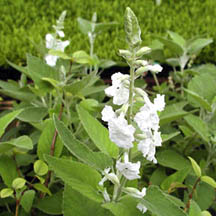
In the Garden![]()
Rick Barboza
Honohono
One of Hawaii's Mintless Mints
Haplostachys haplostachya
Description: Low shrubs about 2 to 3 feet in height with extremely soft, triangular shaped leaves that are light green on top and silvery white underneath. The reason they are so soft is due to the many tiny hairs which cover the leaf surfaces. These hairs reflect sunlight away from the plant, reducing the amount of water lost through transpiration. In addition to this feature, honohono also sends out a beautiful spike of sweet smelling flowers. Each spike is up to a foot-and-a-half long and is covered with several white flowers about 2 inches long. Trust me, they smell as sweet as they look.

|
Cultural uses: First recorded during the time of Captain Cook, this has always been a rare plant and possibly for that reason there are no known cultural uses of this plant.
Landscape use and care: This plant is an excellent addition to any garden and is a must have for native and rare plant collectors. It requires very little watering and does best in full sun. Few pests bother it although if left in a wet location for some time it will start to develop small spots of white mold. If you notice this on your plant, simply move it to a different location or reduce the watering schedule. This plant has been offered for sale in the past on a limited scale. They will be offered for sale along with many other native plants at this weekend's Waimea Valley Arboretum Plant Sale in North Shore's Waimea Falls Park. The sale starts at 9 a.m. and ends at 2 p.m.
Also: As noted above, this is one of Hawaii's many native mintless mints. The flavor of mint within the leaves of mint plants is a natural defense of the plant to protect it from grazing predators such as deer and goats. But because these plants evolved in Hawaii there were no predators here and the mint defense was useless so rather than waste its energy defending itself, it lost it all together. Instead, these plants now have large beautiful, sweet smelling flowers which may aid reproduction but more studies need to be done to confirm that theory.

